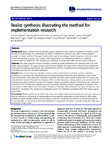Realist synthesis: illustrating the method for implementation research
| dc.contributor.author | Rycroft-Malone, J | |
| dc.contributor.author | McCormack, B | |
| dc.contributor.author | Hutchinson, AM | |
| dc.contributor.author | DeCorby, K | |
| dc.contributor.author | Bucknall, TK | |
| dc.contributor.author | Kent, B | |
| dc.contributor.author | Schultz, A | |
| dc.contributor.author | Snelgrove-Clarke, E | |
| dc.contributor.author | Stetler, CB | |
| dc.contributor.author | Titler, M | |
| dc.contributor.author | Wallin, L | |
| dc.contributor.author | Wilson, V | |
| dc.date.accessioned | 2016-12-16T18:23:03Z | |
| dc.date.available | 2016-12-16T18:23:03Z | |
| dc.date.issued | 2012-12 | |
| dc.identifier.issn | 1748-5908 | |
| dc.identifier.issn | 1748-5908 | |
| dc.identifier.other | 33 | |
| dc.identifier.uri | http://hdl.handle.net/10026.1/8135 | |
| dc.description.abstract |
BACKGROUND: Realist synthesis is an increasingly popular approach to the review and synthesis of evidence, which focuses on understanding the mechanisms by which an intervention works (or not). There are few published examples of realist synthesis. This paper therefore fills a gap by describing, in detail, the process used for a realist review and synthesis to answer the question 'what interventions and strategies are effective in enabling evidence-informed healthcare?' The strengths and challenges of conducting realist review are also considered. METHODS: The realist approach involves identifying underlying causal mechanisms and exploring how they work under what conditions. The stages of this review included: defining the scope of the review (concept mining and framework formulation); searching for and scrutinising the evidence; extracting and synthesising the evidence; and developing the narrative, including hypotheses. RESULTS: Based on key terms and concepts related to various interventions to promote evidence-informed healthcare, we developed an outcome-focused theoretical framework. Questions were tailored for each of four theory/intervention areas within the theoretical framework and were used to guide development of a review and data extraction process. The search for literature within our first theory area, change agency, was executed and the screening procedure resulted in inclusion of 52 papers. Using the questions relevant to this theory area, data were extracted by one reviewer and validated by a second reviewer. Synthesis involved organisation of extracted data into evidence tables, theming and formulation of chains of inference, linking between the chains of inference, and hypothesis formulation. The narrative was developed around the hypotheses generated within the change agency theory area. CONCLUSIONS: Realist synthesis lends itself to the review of complex interventions because it accounts for context as well as outcomes in the process of systematically and transparently synthesising relevant literature. While realist synthesis demands flexible thinking and the ability to deal with complexity, the rewards include the potential for more pragmatic conclusions than alternative approaches to systematic reviewing. A separate publication will report the findings of the review. | |
| dc.format.extent | 33- | |
| dc.format.medium | Electronic | |
| dc.language | en | |
| dc.language.iso | eng | |
| dc.publisher | Springer Science and Business Media LLC | |
| dc.subject | Evidence-Based Medicine | |
| dc.subject | Health Services Research | |
| dc.subject | Humans | |
| dc.subject | Review Literature as Topic | |
| dc.title | Realist synthesis: illustrating the method for implementation research | |
| dc.type | journal-article | |
| dc.type | Article | |
| plymouth.author-url | https://www.ncbi.nlm.nih.gov/pubmed/22515663 | |
| plymouth.issue | 1 | |
| plymouth.volume | 7 | |
| plymouth.publication-status | Published | |
| plymouth.journal | Implementation Science | |
| dc.identifier.doi | 10.1186/1748-5908-7-33 | |
| plymouth.organisational-group | /Plymouth | |
| plymouth.organisational-group | /Plymouth/Faculty of Health | |
| plymouth.organisational-group | /Plymouth/Faculty of Health/School of Nursing and Midwifery | |
| plymouth.organisational-group | /Plymouth/REF 2021 Researchers by UoA | |
| plymouth.organisational-group | /Plymouth/REF 2021 Researchers by UoA/UoA03 Allied Health Professions, Dentistry, Nursing and Pharmacy | |
| plymouth.organisational-group | /Plymouth/Research Groups | |
| plymouth.organisational-group | /Plymouth/Research Groups/Institute of Health and Community | |
| plymouth.organisational-group | /Plymouth/Research Groups/Plymouth Institute of Health and Care Research (PIHR) | |
| plymouth.organisational-group | /Plymouth/Users by role | |
| plymouth.organisational-group | /Plymouth/Users by role/Academics | |
| dc.publisher.place | England | |
| dcterms.dateAccepted | 2012-04-05 | |
| dc.identifier.eissn | 1748-5908 | |
| dc.rights.embargoperiod | No embargo | |
| rioxxterms.versionofrecord | 10.1186/1748-5908-7-33 | |
| rioxxterms.licenseref.uri | http://www.rioxx.net/licenses/all-rights-reserved | |
| rioxxterms.licenseref.startdate | 2012-04-19 | |
| rioxxterms.type | Journal Article/Review |


